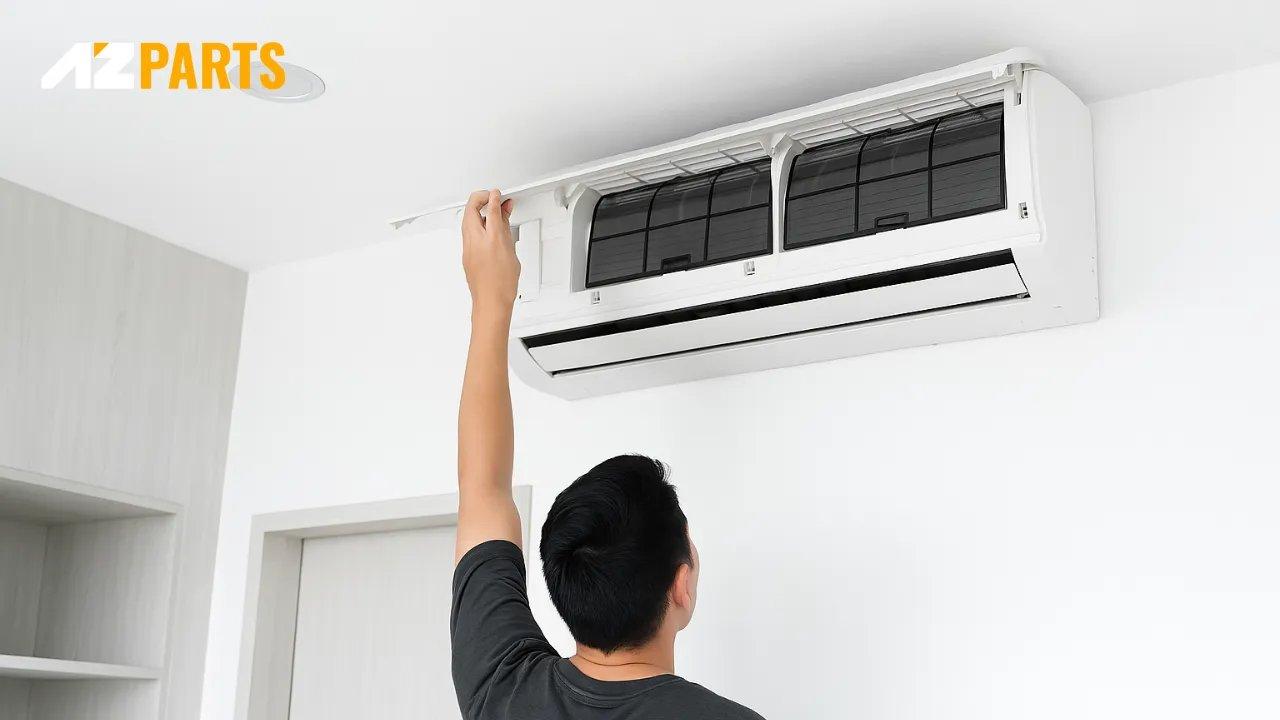Repair help
Can I Replace My AC Capacitor Without a Technician?
AZparts Team
Updated on October 24, 2025
9 min read
Many homeowners ask, can I replace AC capacitor myself when their air conditioner stops working. While it may seem like a simple DIY fix, replacing a capacitor involves handling high-voltage components that can pose serious safety risks. Before attempting the task, it’s crucial to understand how capacitors function and why extra caution is needed. In this guide, join AZParts to explore what it takes to replace your AC capacitor safely and help you decide if you should do it yourself or call a technician.
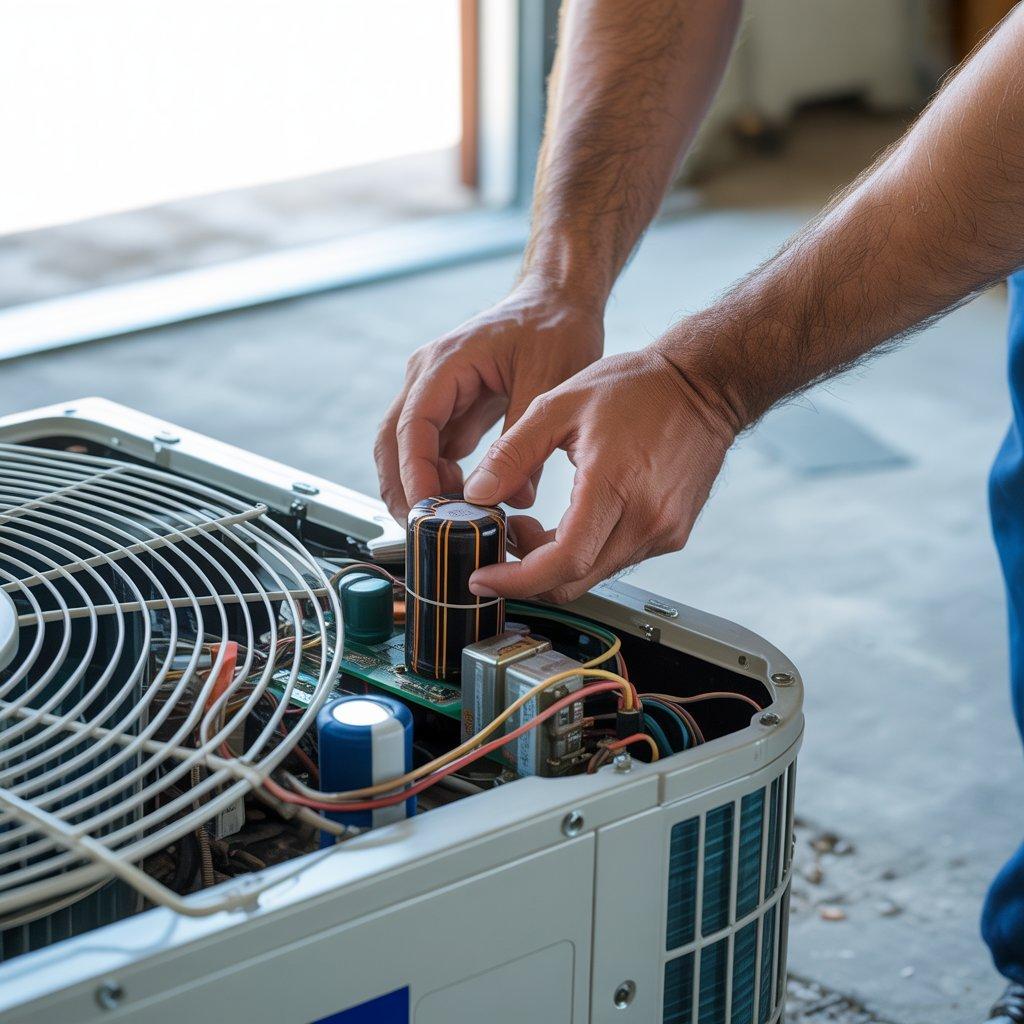
1. Understanding What an AC Capacitor Does in Your Cooling System
To understand how your cooling system works efficiently, it’s important to know what an AC capacitor is and what role it plays. Capacitors are small but vital components in HVAC systems. They store and release electrical energy, giving motors the boost they need to start and keep running. Learning how a capacitor works in HVAC systems helps homeowners recognize the signs of failure and the importance of timely replacement.
1.1. Start Capacitor
A start capacitor provides the initial surge of energy needed to start the compressor and fan motors. It temporarily boosts electrical power when the air conditioner first turns on. This extra energy allows the motors to overcome inertia and reach operational speed quickly. Once the AC unit is running, the start capacitor disconnects from the circuit and no longer contributes to the system. Its function is crucial for a smooth and efficient startup, especially in larger or older units.
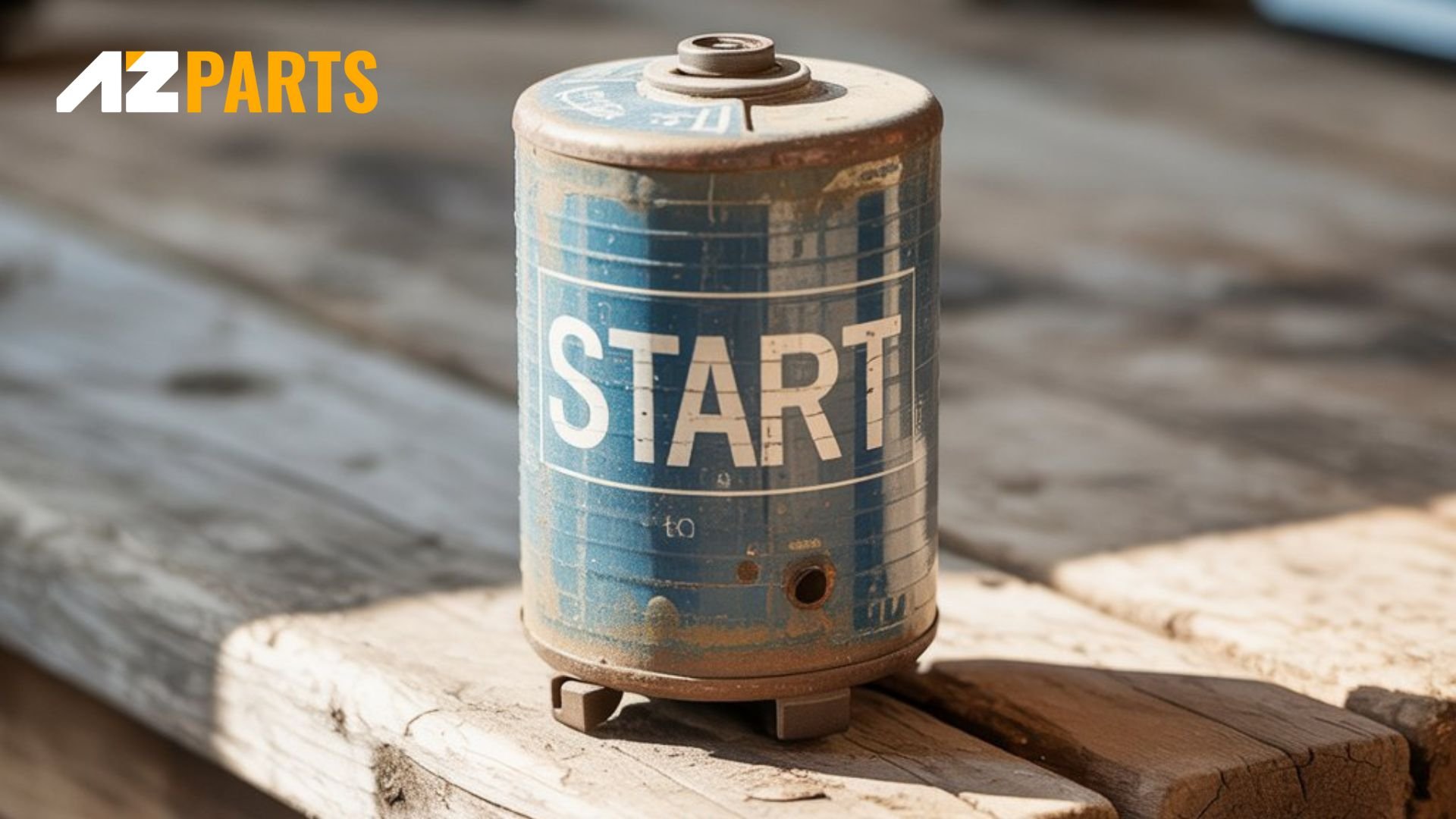
A start capacitor provides the initial surge of energy needed to start the compressor and fan motors (Source: AZParts)
1.2. Run Capacitor
The run capacitor continues to supply a steady level of energy to keep the compressor and fan motors operating smoothly. Unlike the start capacitor, the run capacitor remains active throughout the cooling cycle. It helps maintain a consistent voltage supply, improves efficiency, and reduces wear on system components. A properly functioning run capacitor ensures that your air conditioner runs quietly and reliably, without sudden shutdowns or motor strain.
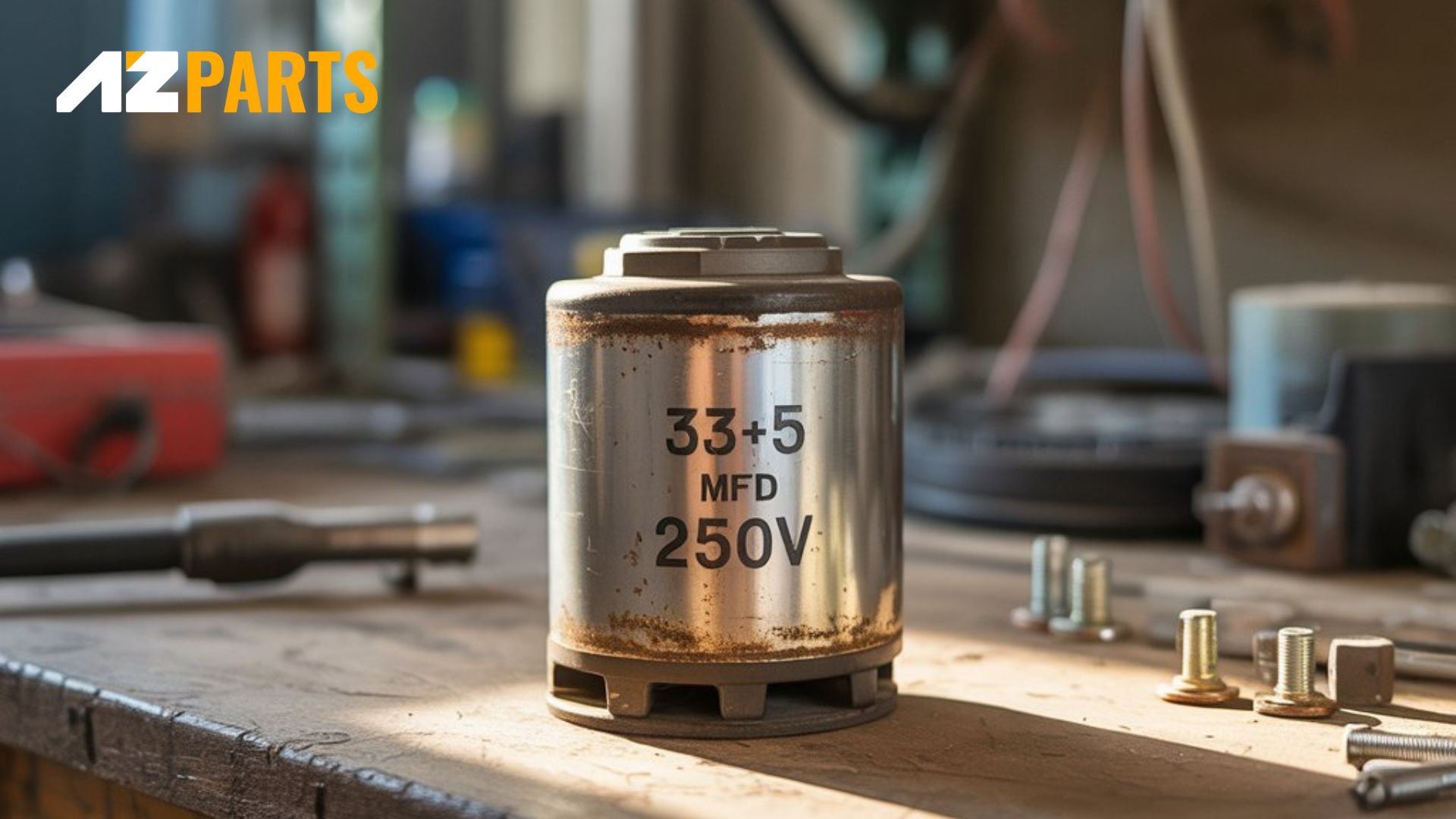
The run capacitor continues to supply a steady level of energy to keep the compressor and fan motors operating smoothly (Source: AZParts)
1.3. Dual-Run Capacitor
A dual-run capacitor combines the functions of both the start and run capacitors into a single unit. It powers both the compressor and the fan motor, making it a common choice for many modern HVAC systems. This type of capacitor helps streamline the system design and simplifies maintenance or replacement. Understanding the capacitor function in this dual format helps identify issues when either starting or running performance declines, as both roles are supported by the same component.
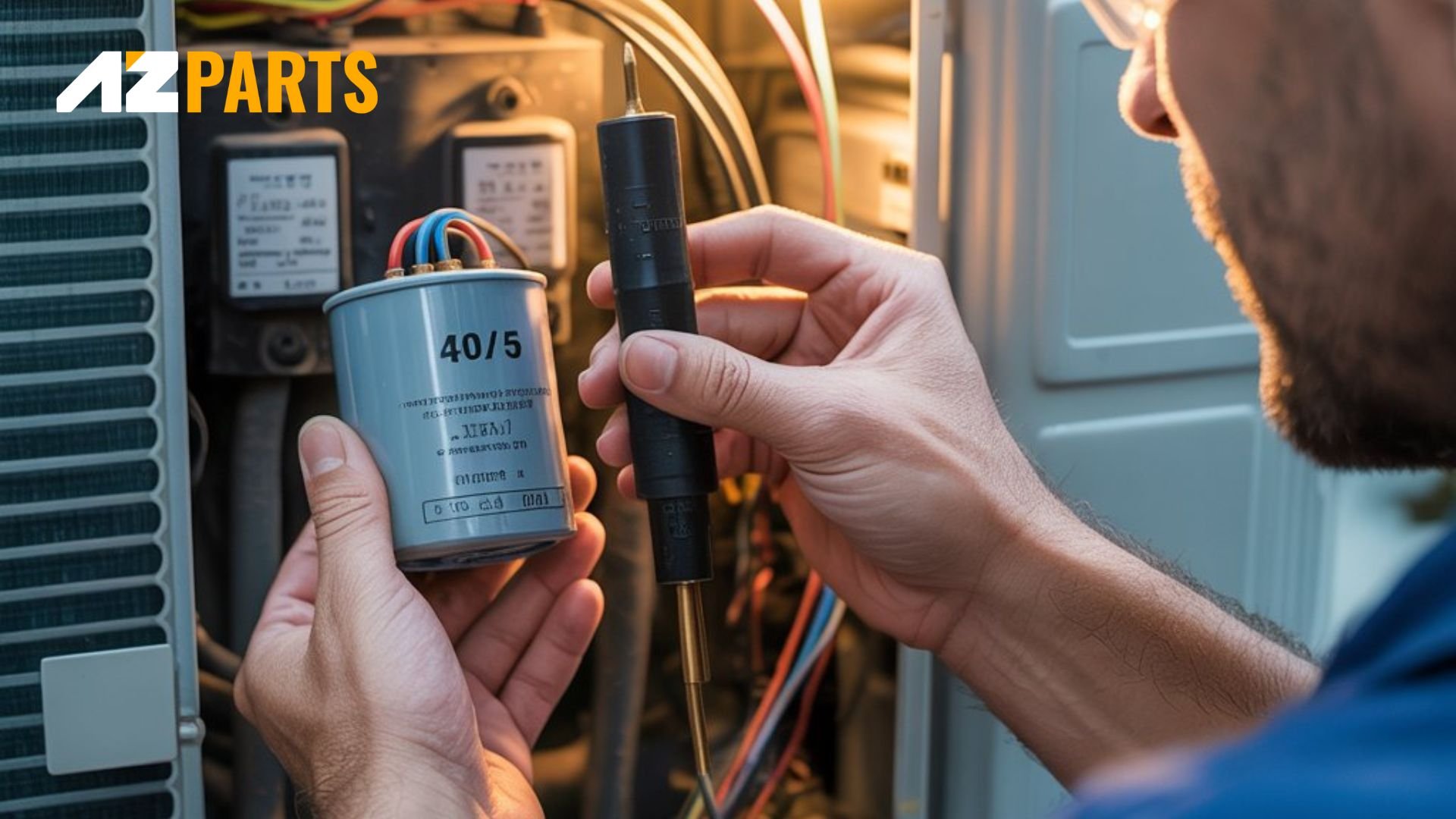
A dual-run capacitor combines the functions of both the start and run capacitors into a single unit (Source: AZParts)
2. Can I Replace an AC Capacitor Myself?
Replacing an AC capacitor on your own can be risky, even though it may appear straightforward. Capacitors store electrical energy and can deliver a shock if not properly discharged. Before starting, make sure the power is completely shut off at the breaker. Discharge the old capacitor safely and use insulated tools and gloves to protect yourself.
It’s also crucial to use the correct replacement that matches the voltage and microfarad ratings. Mistakes can damage your system or pose safety hazards. While some homeowners may feel confident doing this, calling a licensed HVAC technician is usually the safest option. A professional ensures the job is done right and your system runs safely and efficiently.
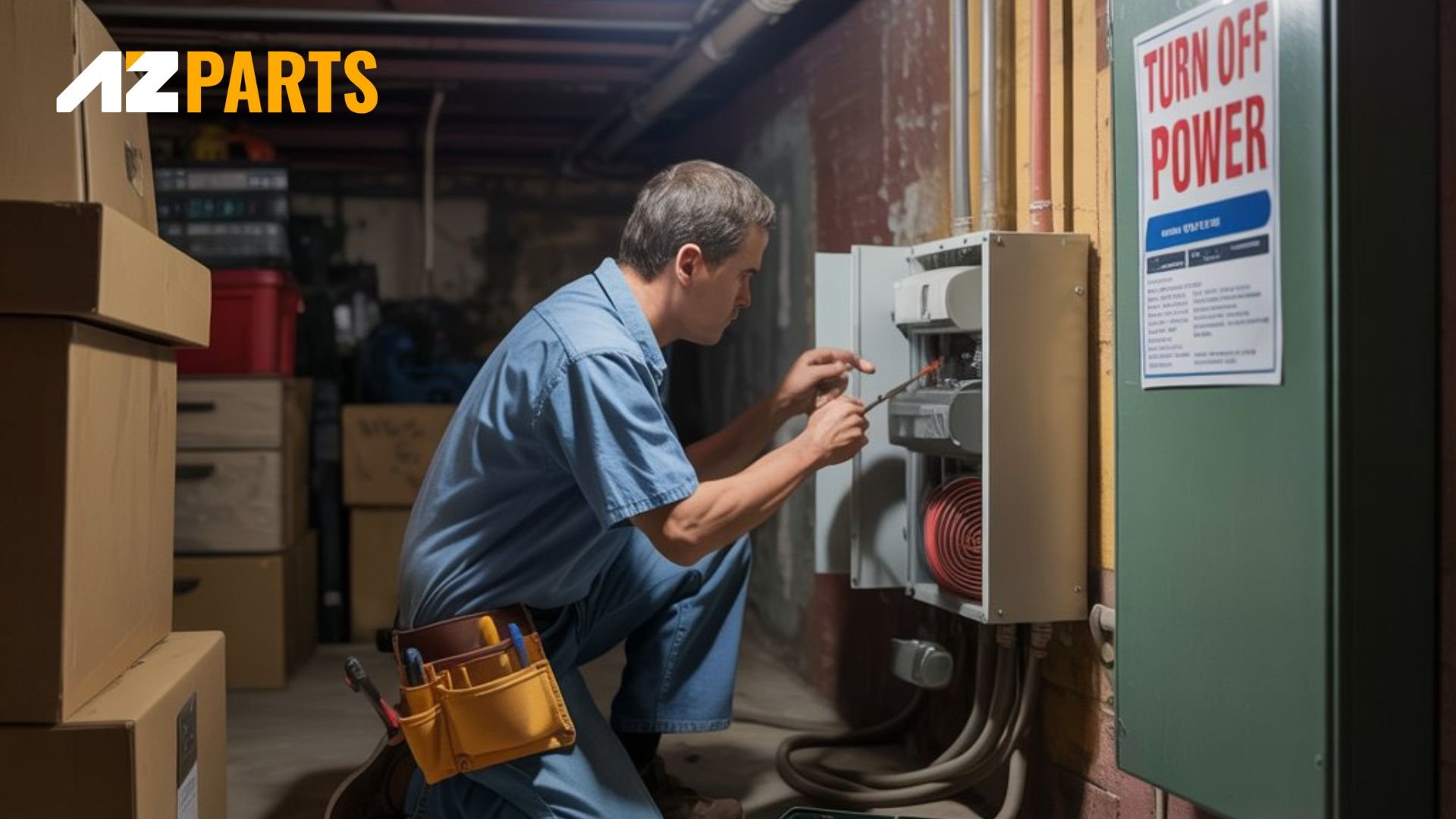
Before starting, make sure the power is completely shut off at the breaker (Source: AZParts)
3. When Should You Replace Your Air Conditioner Capacitor?
Knowing when to replace your air conditioner capacitor is essential for system reliability. Most capacitors last between five and ten years, depending on usage and maintenance. Signs like delayed startup, warm air, or unusual noises often point to a weakening capacitor. Regular AC maintenance helps catch these issues early. Replacing the capacitor at the right time prevents breakdowns and keeps your cooling system running efficiently.
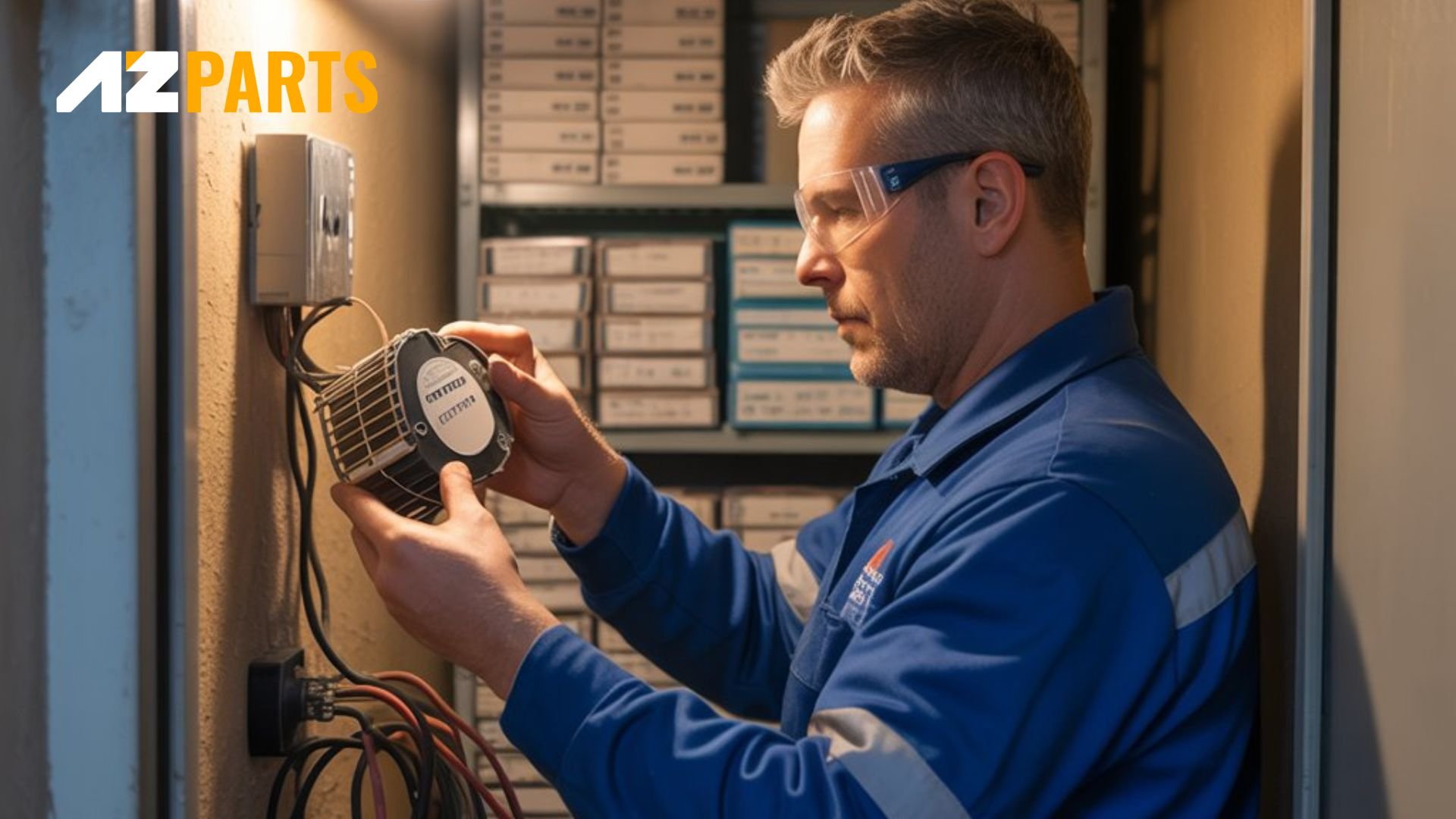
Most capacitors last between five and ten years, depending on usage and maintenance (Source: AZParts)
4. What Causes an AC Capacitor to Fail?
Understanding what causes an AC capacitor to fail is essential for maintaining a reliable cooling system. Capacitors play a vital role in helping your air conditioner start and run efficiently. However, several factors can lead to premature failure, including:
Cause | Explanation |
Age | Over time, the internal components of the capacitor wear out. Symptoms such as weak cooling or delayed startup begin to appear. Most capacitors last five to ten years, depending on usage and maintenance. |
Voltage Overload | Power surges caused by electrical issues or lightning strikes can overwhelm the capacitor. This overload damages internal circuits and may result in system failure. These HVAC failure causes highlight the importance of using surge protection. |
Excess Heat | High temperatures, especially in outdoor units with poor ventilation, can reduce a capacitor’s lifespan. Constant heat exposure speeds up internal degradation and lowers overall efficiency. |
Contamination | Debris or moisture entering the capacitor housing can lead to corrosion or short circuits. This contamination disrupts proper operation and increases the risk of capacitor failure. Regular AC maintenance helps prevent these issues and protects the system. |
5. Warning Signs That Your AC Capacitor Is Dying
Recognizing early signs of capacitor failure can save you from a sudden air conditioning breakdown during peak summer months. Knowing how to tell if an AC capacitor is bad helps you act quickly and maintain consistent cooling performance. Here are some common signs:
- Your vents blow warm air instead of cold, which means the compressor or fan motor may not receive enough power to start.
- There is a noticeable delay when the AC unit tries to turn on. This delay indicates the capacitor is struggling to provide the initial boost.
- You hear clicking or humming sounds as the system attempts to start. These noises suggest the capacitor is weakening.
- Your system shuts down frequently or fails to complete a full cooling cycle. A faulty capacitor often cannot store or release enough charge.
- You see a bulging or leaking capacitor inside the outdoor unit. These visible signs confirm internal damage.
- Your energy bills increase unexpectedly without higher usage. An inefficient capacitor may be overworking other HVAC components.
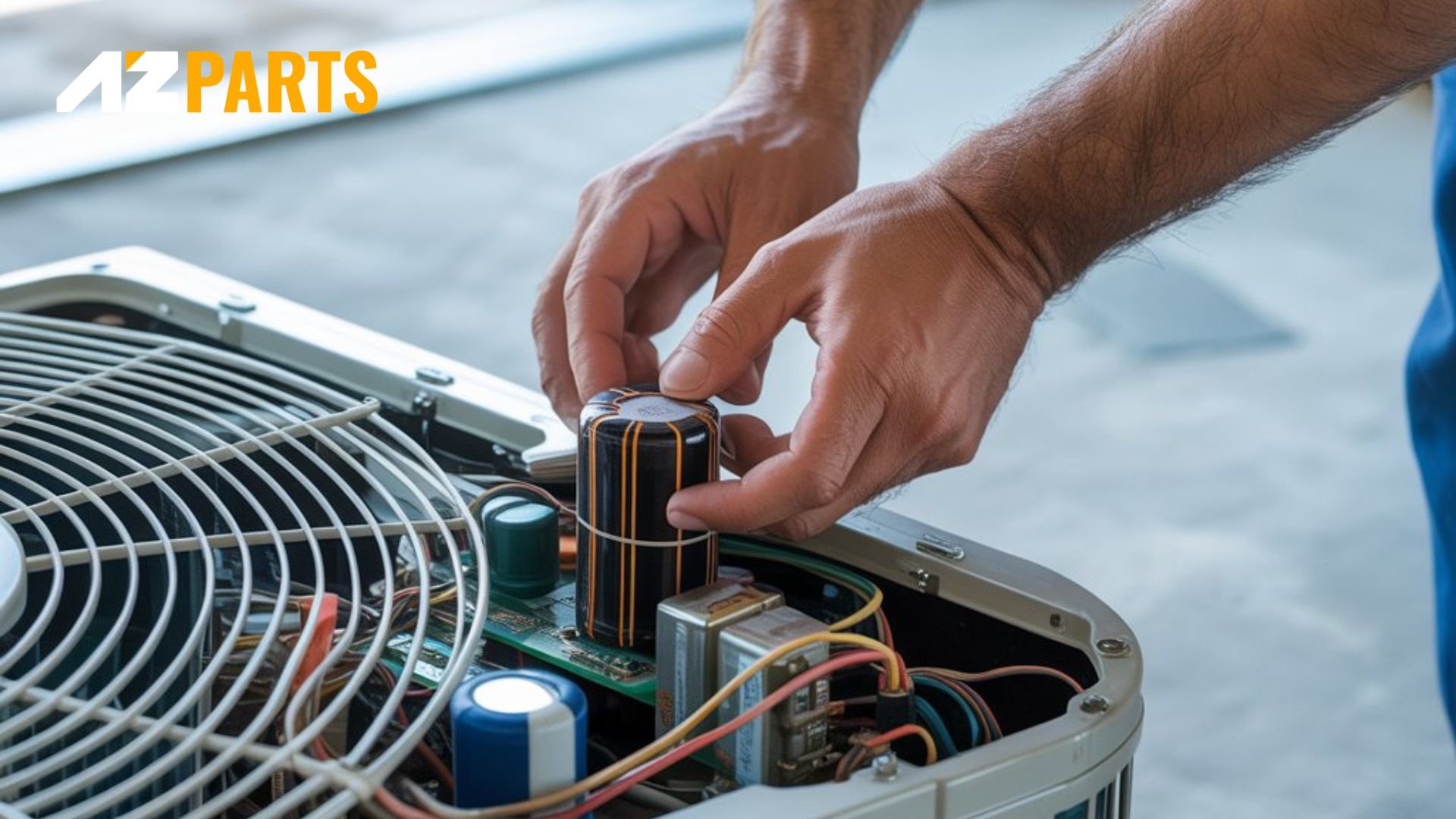
Remember these warning signs that your AC capacitor is about to fail (Source: AZParts)
6. What Does It Cost to Replace an Air Conditioner Capacitor?
When facing a faulty air conditioning system, understanding the cost of AC capacitor replacement helps homeowners make informed repair decisions. The price to replace a capacitor can vary depending on the type, brand, and whether you hire a technician or handle the task yourself. On average, the total capacitor replacement service fee by a professional may range from $100 to $300. This fee includes the part itself and labor, with prices often influenced by location and system complexity.
If you choose to replace the part yourself, purchasing a high-quality capacitor from a trusted source like AZParts can significantly reduce the AC capacitor replacement cost. AZParts offers a wide range of affordable capacitor options suitable for various AC systems.
- For instance, the 189-227 uf/MFD 220-250 VAC Round Start Capacitor is priced at $14.04. This unit is built for single-phase motors and boasts a lifespan of up to 30,000 hours.
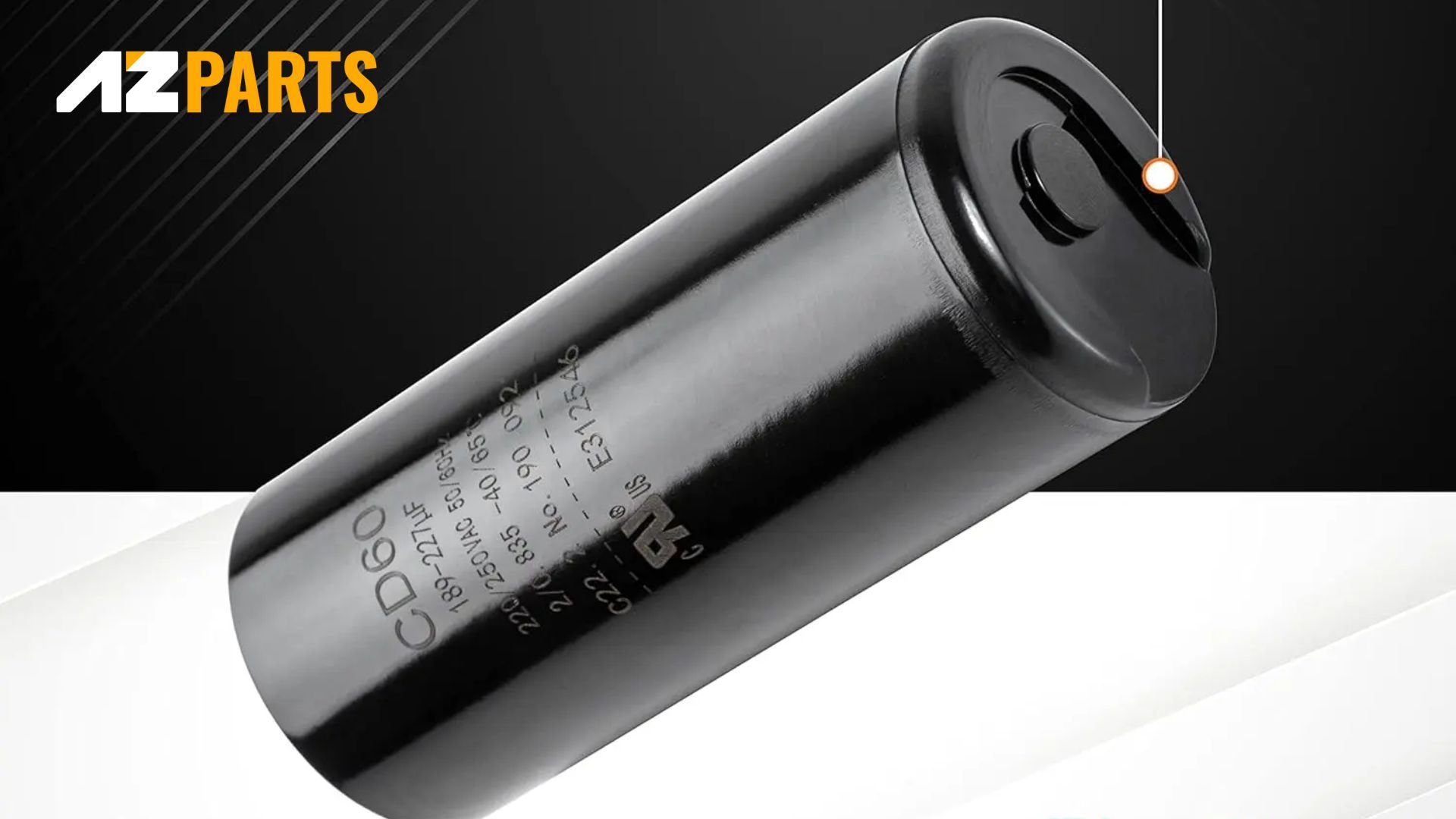
The 189-227 uf/MFD 220-250 VAC Round Start Capacitor is designed for single phase motors, rated at 189-227 uf/MFD and 220-250 VAC (Source: AZParts)
- The 145-175 uf MFD 50/60 Hz 220-250 VAC Round Start Capacitor, designed for air conditioners and general electric motor use, is available for $17.55.
- Another durable option is the 270-324 Mfd uF 250VAC Round Motor Start Capacitor, ideal for high-performance startup applications, priced at $18.72.
These AZParts products provide reliable performance and excellent value for those seeking cost-effective replacement options. There are also other alternative products such as covers, piercing valves, and port adapters. Whether you opt for a professional service or a DIY solution, selecting a quality AC replacement product ensures long-term efficiency and stability for your HVAC system.
7. What to Do If Your AC Capacitor Suddenly Stops Working
When your AC suddenly stops working, a failed capacitor is often the cause. Knowing how to handle this situation helps you restore cooling quickly and safely. Follow these steps:
- Turn off the power at the breaker panel: You should immediately shut off electricity to your HVAC system to prevent further damage or electrical hazards.
- Listen for warning signs: If you hear humming, feel warm air, or notice the system won't start, you may be dealing with capacitor failure. Do not try to restart the unit repeatedly, as this can strain other components like the compressor and fan motor.
- Call a licensed HVAC technician: In an emergency HVAC fix, the safest choice is to let a professional diagnose the issue and replace the capacitor immediately if needed.
- Attempt DIY repair only if qualified: If you have experience with electrical repairs and the right tools, you can replace the capacitor yourself. However, you must follow all capacitor safety precautions.
- Keep a spare capacitor on hand: Preparing ahead by storing a compatible replacement can reduce downtime during peak summer heat.
- Seek professional help if unsure: If you’re not confident in your diagnosis or repair skills, prioritize expert support to protect your system and maintain safe operation.
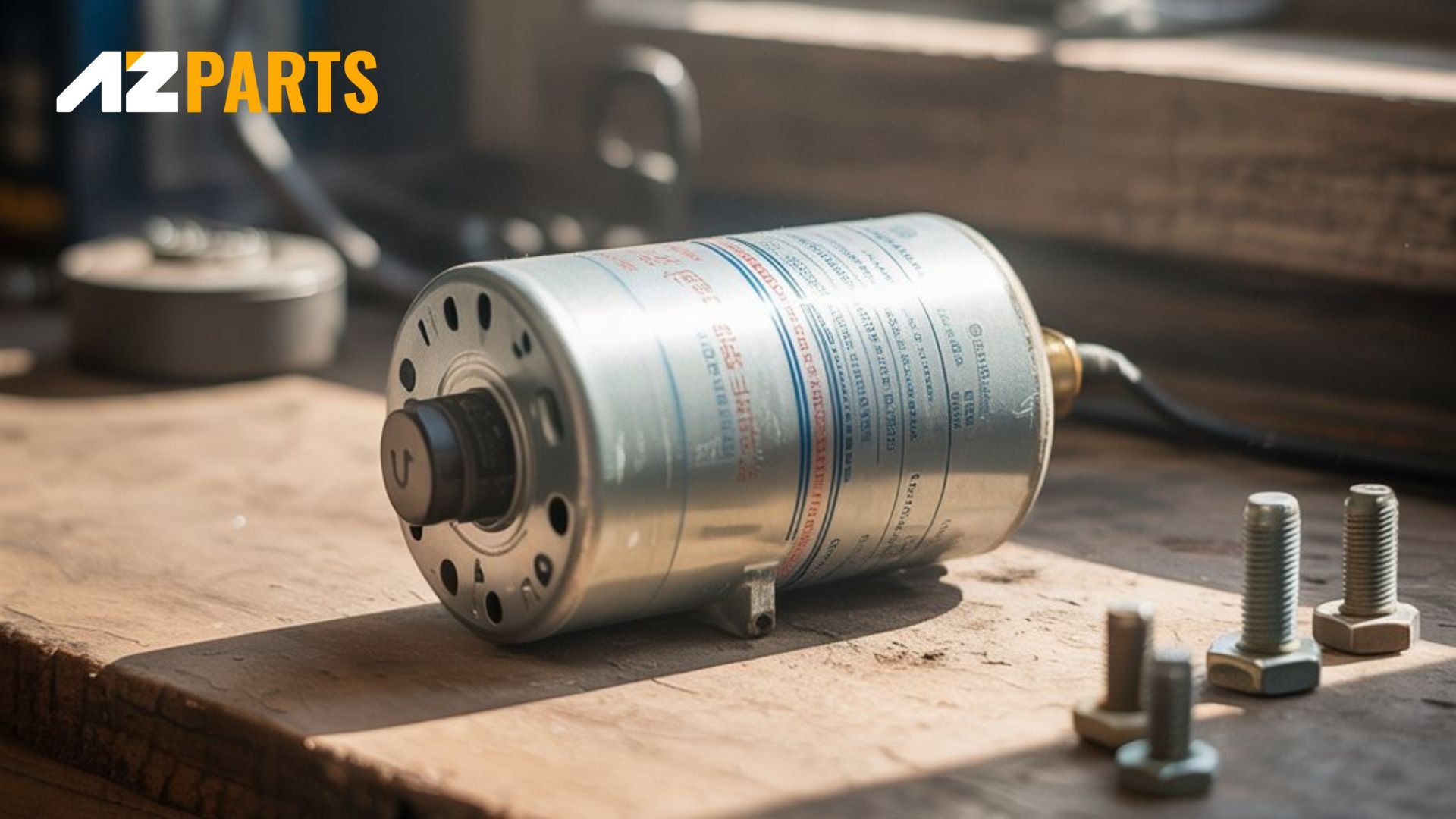
The first step is to turn off power to your HVAC system at the breaker panel (Source: AZParts)
8. FAQ about Replacing AC Capitor at Home
8.1. How Long Does It Take to Change an AC Capacitor?
Replacing an AC capacitor is a relatively quick task. Most HVAC technicians can complete the job within 30 minutes to an hour, depending on their experience and how accessible the unit is. The process includes turning off the power, discharging the old capacitor, installing the new one, and testing the system for proper function. If any related issues are discovered, or the capacitor is hard to reach, the repair may take longer. Homeowners who try a DIY replacement often need more time due to safety precautions or lack of experience.
8.2. Do You Need to Replace Both AC Capacitors Together?
When maintaining your AC system, many homeowners ask whether they should replace both the run and start capacitors together. These two parts work closely, one helps start the motor, while the other keeps it running smoothly. If one fails, it may strain the other. Technicians often recommend replacing both, especially if they’re in a dual capacitor unit. Doing so improves system stability and prevents future breakdowns. Replacing only one may lead to issues if the other is already worn. For reliable performance, it's best to follow expert advice or consult an HVAC professional.
If you feel confident in your electrical skills and take all safety precautions, replacing an AC capacitor yourself can be done. However, if you have any doubts, hiring a professional is the safest choice. Protect your HVAC system and your safety by using high-quality, compatible replacement parts. AZParts offers dependable AC capacitors for a wide range of systems, so you can restore cool comfort to your home without delay.
Contact Information:
- 8 The Green, Ste A, Dover, Delaware 19901-3618, United States
- support@azparts.com
Air conditioner
- 1. Understanding What an AC Capacitor Does in Your Cooling System
- 2. Can I Replace an AC Capacitor Myself?
- 3. When Should You Replace Your Air Conditioner Capacitor?
- 4. What Causes an AC Capacitor to Fail?
- 5. Warning Signs That Your AC Capacitor Is Dying
- 6. What Does It Cost to Replace an Air Conditioner Capacitor?
- 7. What to Do If Your AC Capacitor Suddenly Stops Working
- 8. FAQ about Replacing AC Capitor at Home
Further Reading
Further Reading





